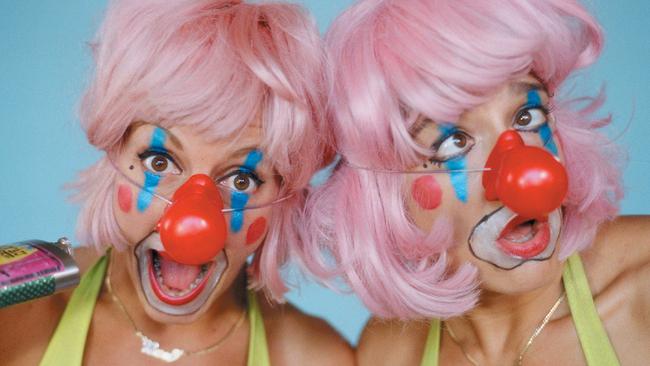Naked frolic on the stage of decency
This week, New York comedy act the Wau Wau Sisters strip down to bare their own grudges against moral absurdity for the Festival of Sydney in Naked as the Day They Were Born Again.

Today in History
Don't miss out on the headlines from Today in History. Followed categories will be added to My News.
“I SAW a woman stark naked in three New York shows, including the Cradle Snatchers,” Australian theatre producer Garry Burcher announced in the summer of 1926.
“The Folies Bergere in Paris is a Sunday school in comparison. I never imagined anything so daring. If it was produced in Australia the audience would wreck the theatre. New York will take anything.”
Weeks later, German religious and political organisations were in uproar over “the nature of postwar stage productions” as a light opera producer announced a revue called Berlin Without a Chemise. Critics complained he had “developed the nudity of the chorus so far that it only remains to disrobe the audience” and demanded police prohibit chemiseless revues.
Stage nudity itself has inspired excellent theatre, marrying high drama with absurd comedy as artists and moralists wrangle across the public stage.
This week, New York comedy act the Wau Wau Sisters strip down to bare their own grudges against moral absurdity for the Sydney Festival in Naked As The Day They Were Born Again.
Decades before full frontal nudity in Hair and Equus, Australian theatregoers were praised for their maturity in an editorial in the Maryborough Chronicle of January 1917. As “prurient gigglers grow scarcer” when confronted with “undraped contours that were formerly covered”, the author hoped that in time the body would no longer be regarded as a ribald thing.
Although public nudity was accepted for athletes in Greek Olympic competitions from 720BC, and a century later Spartans enjoyed nude festivals and exercise, in AD393 as students in ancient Greece exercised and studied naked in the style of Olympic competitors, Christian Emperor Theodosius I banned Olympic Games, deeming them Pagan.
New York district attorney Joab Banton took the Theodosius approach with a rapid crackdown on the city’s shrinking dress standards in 1927, insisting: “Clothing must be raised at the top and lowered at the bottom. I am going to stop this indecency.”
As Banton’s “crusade against stage nudity’’ closed three shows by October 1927 with an order that police patrol wagons stand at stage doors ready to take away all “offending females”, Berlin was embracing public nudity as a psychic salve. In the wake of a schoolboy murdering his friend in a shocking death pact, in February 1928 a Berlin doctor prescribed a “curious antidote”, inviting a private audience to a Berlin theatre to watch men, women and children “entirely devoid of the smallest particle of clothing, carrying out gymnastic and callisthenic exercises”.
Guests, among them Reichstag deputies and “other prominent men and women” commended the show as Dr Hans Graaz argued “the association of men and women in this Garden of Eden raiment was the surest method of obtaining mental and physical health”. University of London psychology professor John Flugel pushed the case in 1930, predicting “Nudity will come soon” in his book The Psychology of Clothes. “Within a few years women will not wear clothes, but will cause little commotion. Encouraged thus, we may with greater equanimity contemplate the possibility that dress is destined to be but an episode in the history of humanity,” Flugel predicted.
The “prowling prudes” of Britain’s Public Morality Council had other ideas. In January 1935, secretary Howard Tyrer defended his members’ right to protest against indecency in dress, dance and gesture, “which degrade audiences, particularly those of an age especially susceptible to sex influence”. At the time nude dancer Joan Warner, accused in a Paris court of outraging public modesty, defended herself as “just a modest American girl, and my dancing is misinterpreted. It has nothing, to do with sex. It is art, pure, art.” As legal authorities researched precedents on what constituted nudity, Warner doubled her salary to £20 a day for her dance displaying “approximate nudity” for 10 to 20 seconds.
Warner argued that her stage attire of thick make-up, dimmed lights with only a blue projector to “clothe her in colour” and tights, brought her nudity to the “irreducible minimum”, a term the court struggled to define.
Back in Britain, from his pulpit at St James’s Church, Piccadilly, Bishop of London Winnington Ingram announced in 1937 that the Lord Chamberlain “was going to call together every person responsible for London theatres to tell them that this nudity on the London stage has got to stop”.
As Europe braced for war, German fuhrer Adolf Hitler was a guest at the Munich Festival, branded a “pageant of nudity”, in July 1939.
Aside from horse racing, the festival featured The Night of the Amazons, with a cast of 1000 including some “100 young women in various degrees of nakedness from bare-breasted Amazons on horseback to completely nude Dianas”.
The next year, the British Home Office called a conference to discuss the escalation of nudity, striptease and risque dialogue on the English stage since the outbreak of war.
Full-frontal nudity in the musical Hair in 1968 rocked British stage censorship, while Australian theatre producer Harry M. Miller insured against a ban by NSW chief secretary Eric Willis by including Dame Zara Holt, widow of former Liberal prime minister Harold Holt, in a preview audience before the show opened on June 4, 1969, at the Metro Theatre in Kings Cross.
Wau Wau Sisters; January 20-25; Hyde Park North; $45/$41


